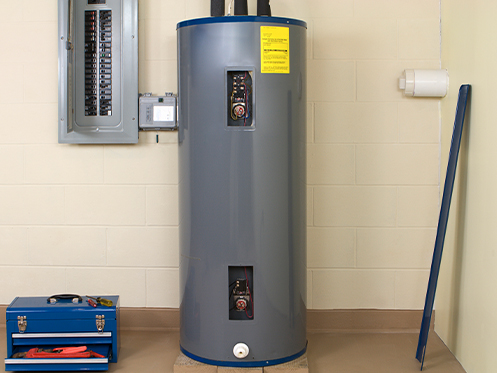Hot water is an essential part of our daily lives, whether it’s for bathing, cooking, or cleaning. When it comes to water heating, there are two common options, traditional hot water tanks, and tankless water heaters. While both options provide hot water, they operate on different principles and offer distinct advantages and disadvantages. In this blog, we will look at the key differences between these two types of water heaters to help you make an informed decision on what is right for you and your home.
Traditional Hot Water Tanks
Traditional hot water tanks, also known as storage water heaters, have been used for decades in households around the world. These tanks are typically large, cylindrical containers that store and heat water continuously. The water is heated using electric elements or gas burners located at the bottom of the tank. As the water heats, it rises to the top of the tank, where it is ready for use.
Advantages:
Cost-Effective: Traditional hot water tanks are often more affordable to purchase and install compared to tankless water heaters.
Simplicity: They have straightforward installation and maintenance processes, making them easier to handle for homeowners and HVAC technicians alike.
Steady Supply: These tanks can supply hot water to multiple outlets simultaneously without fluctuations in temperature.
Disadvantages:
Limited Capacity: The amount of hot water available is limited to the tank’s capacity, which may lead to running out of hot water during high-demand periods.
Energy Loss: Standby heat loss occurs as the tank keeps the water hot even when not in use, resulting in energy wastage.
Bulky Size: The traditional hot water tank occupies significant floor space and may not be ideal for small living spaces.

Tankless Water Heaters
Tankless water heaters, also known as on-demand water heaters, have gained popularity in recent years due to their energy efficiency and space-saving design. Unlike traditional tanks, tankless water heaters do not store hot water. Instead, they heat the water instantly as it passes through the unit using electric coils or gas burners.
Advantages:
Energy Efficiency: Tankless water heaters only heat water when needed, eliminating standby heat loss and potentially reducing energy consumption.
Endless Hot Water: As long as the demand is within the unit’s capacity, tankless heaters can provide a continuous supply of hot water.
Space-Saving: The tankless water heater’s compact design allows for flexible installation, making them ideal for smaller homes or apartments.
Disadvantages:
Higher Initial Cost: Tankless water heaters typically have a higher upfront cost.
Limited Output: If the demand exceeds the heater’s capacity, the water temperature may decrease, affecting the flow rate.
Complex Installation: Installing tankless water heaters might require additional modifications to existing plumbing, leading to higher installation costs in some cases. This is why it is best to leave the installation of these units to the experts at Comfort Zone.
Conclusion
Choosing between a traditional hot water tank and a tankless water heater depends on your household’s specific needs and priorities. While traditional tanks offer simplicity and lower initial costs, tankless water heaters boast energy efficiency and a continuous supply of hot water. Consider the size of your household, hot water consumption, and budget to make an informed decision that best suits your requirements. If you are unsure if a tankless is right for you or just want more information, contact us and let us answer all your questions.




